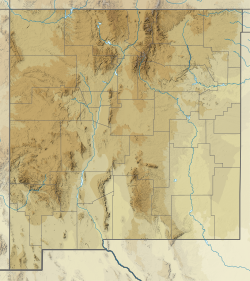Beeman Formation
| Beeman Formation | |
|---|---|
| Stratigraphic range: | |
| Type | Formation |
| Underlies | Holder Formation |
| Overlies | Gobbler Formation |
| Thickness | 350–500 ft (110–150 m) |
| Lithology | |
| Primary | Shale |
| Other | Limestone, conglomerate |
| Location | |
| Coordinates | 32°49′48″N 105°54′18″W / 32.83°N 105.905°W |
| Region | New Mexico |
| Country | United States |
| Type section | |
| Named for | Beeman Canyon |
| Named by | L.C. Pray |
| Year defined | 1954 |
The Beeman Formation is a geologic formation in the Sacramento Mountains of New Mexico.[1][2] It preserves fossils dating back to the Kasimovian Age of the Pennsylvanian Period.[3]
Description[edit]
The Beeman Formation consists of cyclic[4] shale and argillaceous limestone with some conglomerate. The thickness is 350–500 ft (110–150 m).[5] The formation overlies the Gobbler Formation and is overlain by the Holder Formation.[1]
The formation is interpreted as cyclic deposition on a continental shelf following rejuvenation of the Pedernal uplift of the Ancestral Rocky Mountains.[4]
Fossils[edit]
The unit contains middle to upper Missourian (Kasimovian) fusulinids[5] and conodonts, including several species of the fusulinid Triticites and the conodont Idiognathodus symmetricus, related species, and species of Streptognathodus. These species indicate that the Beeman Formation is entirely Kasimovian in age.[3] The formation has a diverse coprofauna.[6] The formation has also produced a lacustrine fauna from one of its shell beds, including the horseshoe crab Euproops danae.[7]
History of investigation[edit]
The unit was first named by Lloyd C. Pray in 1954[1] and a type section was designated in 1959.[5] Pray originally assigned the formation to the Magdalena Group, but the Magdalena Group has subsequently been abandoned.[8][2]
See also[edit]
References[edit]
- ^ a b c Pray, L.C. (1954). "Outline of the stratigraphy and structure of the Sacramento Mountain escarpment [Otero County, New Mexico]" (PDF). New Mexico Geological Society Field Conference Guidebook. 5: 92–107. Retrieved 29 July 2020.
- ^ a b Kues, B.S.; Giles, K.A. (2004). "The late Paleozoic Ancestral Rocky Mountain system in New Mexico". In Mack, G.H.; Giles, K.A. (eds.). The geology of New Mexico. A geologic history: New Mexico Geological Society Special Volume 11. pp. 95–136. ISBN 9781585460106.
- ^ a b Wahlman, G.P.; Barrick, J.E. (2018). "Fusulinid and Conodont biostratigraphy of the Beeman formation (Pennsylvanian), Sacramento Mountains, New Mexico" (PDF). New Mexico Geological Society Field Conference Series. 69: 83–91. Retrieved 21 September 2020.
- ^ a b Raatz, William D.; Simo, J. A. (1998). "The Beeman Formation (Upper Pennsylvanian) of the Sacramento Mountains, New Mexico: Guide to the Dry Canyon area with discussion on shelf and basin responses to eustasy, tectonics, and climate" (PDF). New Mexico Geological Society Fall Field Conference Guidebook. 49: 161–176. Retrieved 18 September 2020.
- ^ a b c Pray, L.C., 1959, "Stratigraphic and structural features of the Sacramento Mountain Escarpment, New Mexico", IN Pray, L.C., leader, Guidebook for joint field conference in the Sacramento Mountains of Otero County, New Mexico: Society of Economic Paleontologists and Mineralogists, Permian Basin Section, Field Trip Guidebook, Joint field conference of Society of Economic Paleontologists and Mineralogists, Permian Basin Section, and Roswell Geological Society, Alamogordo, NM, p. 86-130.
- ^ Hunt, Adrian P.; Lucas, Spencer G.; Spielmann, Justin A.; Cantrell, Amanda K.; Suazo, Thomas L. (2012). "A new marine coprofauna from the Beesman Formation (late Pennsylvanian:late Missourian), Sacramento Mountains, New Mexico, USA". New Mexico Museum of Natural History and Science Bulletin. 57. Retrieved 18 September 2020.
- ^ Lucas, Spencer G.; Lerner, Allan J.; Dimchele, William A.; Cantrell, Amanda K.; Suazo, Thomas L.; Chaney, Dan S. (2014). "Xiphosurid fossils from the Pennsylvanian Beeman Formation, Otero County, New Mexico" (PDF). New Mexico Geological Society Field Conference Series. 65: 311–314. Retrieved 18 September 2020.
- ^ Pray, L.C. (1961). "Geology of the Sacramento Mountains Escarpment, Otero County, New Mexico". New Mexico Bureau of Mines and Mineral Resources Bulletin. 35. Retrieved 30 July 2020.


